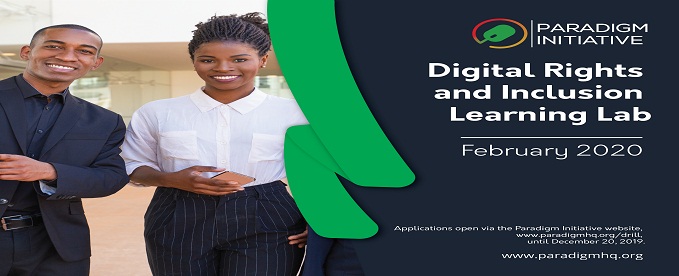Telecom
Paradigm Initiative Opens Learning Lab for Digital Rights and Inclusion

Paradigm Initiative has said that its first Digital Rights and Inclusion Learning Lab (DRILL) will begin operations in February 2020, and will operate from its new headquarters in Lagos, Nigeria.
According to the group, “DRILL has a mission to host innovative learning around digital rights and inclusion in Africa, and serve as a space for both practice and reflection.
“The Learning Lab will involve, and connect different stakeholders and create dialogue amongst researchers, social innovators, policymakers and actors, the private sector, as well as civil society.
“As a lighthouse for digital rights and inclusion advocacy in Africa, learning activities will take place at the Lab in order to evolve new thinking on digital rights and inclusion strategy for Africa.
“There are a variety of activities that will take place, including, but not limited to, focused future-facing research; presentations; ecosystem meetings and discussions focused on digital rights and/or inclusion hosted within the ecosystem; and general communication about the lab’s activities.
“DRILL will offer a space for big thinking, evaluation of digital rights and digital inclusion programs, and future-proofing ecosystem activities.
“DRILL will host innovators, researchers and/or entrepreneurs-in-residence at the PIN HQ so they can host biweekly ecosystem/sector meetings (to share insight/ideas), biweekly presentations (to share outcomes of their research and/or work) and work with the Executive Director to record a monthly DRILL podcast on topical issues.”
‘Gbenga Sessan, executive director, Paradigm Initiative. Speaking about the Lab, said“There are both enormous challenges and opportunities for realizing the ambitious task of creating an inclusive, healthy, safe and open Internet in the coming decade for all Africans, including marginalized and vulnerable populations such as women and girls, people with lower income levels or living in rural communities, sexual minorities, the elderly and persons with disabilities.
“Connecting the next billion, who mostly live on the African continent, requires not only technological and commercial innovations, but also new models of collaboration among all stakeholders,” he continued.
He added, “The selection process for the DRILL Fellowship will be supported by an External Advisory Group made up of ecosystem leaders, including Alberto J. Cerda Silva (Ford Foundation), Anriette Esterhuysen (Association for Progressive Communications), John Dada (Fantsuam Foundation), Nnenna Nwakanma (World Wide Web Foundation), and Oreoluwa Somolu Lesi (Women’s Technology Empowerment Centre), who will help shape the program and work with the PIN team to review Fellowship applications.”
The inaugural fellowship of the Digital Rights and Inclusion Learning Lab will start in February 2020. The fellowship will be open for a period of three months at a time, but can be renewed for another three months, depending on planned activities and joint reviews between the Fellows and PIN.
“As a mid-career fellowship, potential candidates will be expected to have had a minimum of 5 years’ experience as technology or social innovators, researchers, policy experts, and/or entrepreneurs,” said Emmanuel Vitus, Communications Officer at Paradigm Initiative.
In his words, “Paradigm Initiative will cover costs associated with learning activities at the Digital Rights and Inclusion Learning Lab and provide office space, an opportunity to be embedded within our team, access to the ecosystem, and feedback on projects throughout the duration of the Fellowship.”
Applications are open via the Paradigm Initiative website, www.paradigmhq.org/drill, until December 20, 2019.
Telecom
MTN Nigeria Crowns Ayo Benzi Winner of Next Afrobeats Star

MTN Nigeria, in collaboration with ONErpm and Ultima Studios, has announced Ayodeji Benson, popularly known as Ayo Benzi, as the winner of the maiden edition of the Next Afrobeats Star reality show.

L-R: Onyinye Ikenna-Emeka, Chief Marketing Officer, MTN Nigeria; Ayodeji Benson, Winner, Next Afrobeats Star Reality Show (Season 1) and Emamoke Ogoro, General Manager, Brand and Communication, MTN Nigeria, at the grand finale of the Next Afrobeats Star Reality Show (Season 1), held at the Ultima Studios, Lekki, Lagos on Saturday, December 13, 2025.
The grand finale, held on Sunday night at Ultima Studios in Lekki, Lagos, marked the climax of a nationwide talent search that began in September with over 15,000 aspiring musicians.
After weeks of auditions, mentorship, and rigorous training, five finalists – Ayo Benzi, Dave Cash, Kaeko, Somto O’Laker, and Lucky Yay – battled for the top prize in a high-energy showcase of performance and artistry.
At the end of the electrifying contest, Ayo Benzi emerged victorious, securing a ₦150 million music deal. Dave Cash was named first runner-up with ₦100 million, while Kaeko, Somto O’Laker, and Lucky Yay received ₦75 million, ₦50 million, and ₦25 million respectively.
Throughout the season, contestants were mentored by leading Afrobeats producers Sarz, Puffy Tee, P Prime, and Andre Vibez. Benzi, who was part of Puffy Tee’s team, credited the mentorship programme for sharpening his craft and stage presence.
Speaking at the event, Onyinye Ikenna-Emeka, Chief Marketing Officer of MTN Nigeria, said the initiative reflects the company’s commitment to youth empowerment and cultural expression.
“The Next Afrobeats Star platform is about creating real opportunities for young Nigerians and giving their talent the structure, visibility, and support it deserves.
“Afrobeats continues to place Nigeria on the global cultural map, and MTN is proud to be enabling the next generation of artists who will take this sound even further,” she said.
She added that the finale was not just a competition but a celebration of growth and readiness for the global stage.
In his acceptance speech, Ayo Benzi described the victory as a defining moment in his career.
“A big thank you to MTN. From the audition days, the treatment MTN has given us has been amazing. God bless the brand,” he said.
The finale also featured guest performances by Afrobeats stars Iyanya and Bella Shmurda, adding glamour to the night and reinforcing the show’s connection to the wider music ecosystem.
With the successful conclusion of the season, MTN Nigeria and its partners reaffirmed their role in championing youth ambition, supporting creative industries, and shaping the future of Nigerian music through platforms that turn potential into opportunity.
Telecom
T2 Faces NCC Probe in Benue Over Major Service Outage in 9 LGAs

T2, formerly known as 9mobile, is under investigation by the Nigerian Communications Commission (NCC) in Benue State for an undisclosed incident disrupting USSD, SMS, voice, and data services across nine local government areas.

T2
The affected areas include Ado, Agatu, Gwer East, Gwer West, Konshisha, Obi, Ohimini, Okpokwu, and Otukpo, as detailed in an advisory on the NCC Major Outages Portal, which tracks significant disruptions reported by Mobile Network Operators (MNOs) and Internet Service Providers (ISPs).
Neither T2 nor its public relations firm, Chain Reactions, has responded to inquiries on the outage’s cause or restoration efforts as of this report.
The NCC’s continued reference to the operator as 9mobile, months after its public rebranding to T2 in August 2025, has sparked questions about whether the name change was formally notified to the regulator.
This probe aligns with NCC mandates requiring operators to disclose major outages, their impacts, and timelines for fixes, with compensation obligatory for disruptions exceeding 24 hours under the Consumer Code of Practice Regulations.
Industry watchers note that such incidents, often linked to fibre cuts, power failures, or infrastructure faults, underscore ongoing challenges in Nigeria’s telecoms sector, particularly amid T2’s subscriber losses post-rebrand. NCC vows transparency via its portal to hold operators accountable and protect consumers.
Telecom
NCC Unveils Draft 5-Year Spectrum Roadmap, 60 GHz License-Exempt Guidelines to Boost Broadband, Innovation

Nigerian Communications Commission (NCC) has unveiled two pivotal regulatory draft documents aimed at reshaping Nigeria’s communications sector over the next five years and fast-tracking deployment of ultra-high-speed wireless technologies.

NCC
In a public notice dated December 19, 2025, and issued pursuant to its mandate under the Nigerian Communications Act (NCA) 2003, the Commission published the Draft 5-Year Spectrum Roadmap for the Communications Sector (2025–2030) and Draft Guidelines for the Use of the 60 GHz License-Exempt Band for Multi-Gigabit Wireless Systems.
Both documents are accessible on the NCC website for stakeholder review, with the roadmap outlining strategic spectrum planning, allocation, and management to optimise utilisation, support emerging technologies like 5G and IoT, expand broadband access, and align with global best practices.
The Spectrum Roadmap emphasises four core pillars: bridging the digital divide through low-band spectrum and satellite services, attracting investments via flexible licensing models, enhancing service quality with mid-band optimisation, and fostering innovation in areas such as direct-to-device connectivity and secondary spectrum trading.
It sets ambitious targets including universal 4G coverage nationwide, 50 per cent 5G penetration in state capitals, and average broadband speeds of 100 Mbps by 2030, while addressing rising data demand through band refarming and efficient management.
Complementing this, the 60 GHz Guidelines establish a license-exempt framework for the 57–66 GHz band, enabling multi-gigabit speeds up to 10 Gbps for short-range applications like WiGig, fixed wireless access, enterprise connectivity, urban broadband, and backhaul solutions.
The rules mandate NCC type approval for equipment, site registration for outdoor use, and interference mitigation measures, while prohibiting wide-area networks to safeguard primary users.
In line with Section 58 of the NCA 2003, NCC invites comments from industry operators, equipment manufacturers, consumer groups, and the public, with submissions due by Friday, January 16, 2025, via email to [email protected], [email protected], and [email protected].
The notice, signed by Mrs Nnenna Ukoha, Head of Public Affairs, stresses that stakeholder inputs will refine the frameworks to drive innovation, investment, competition, and sustainable growth in Nigeria’s telecoms ecosystem.

 Telecom3 days ago
Telecom3 days agoNnaemeka Ani – The Architect of ‘Code and Courage’

 E-Financial3 days ago
E-Financial3 days agoNigeria’s N58.18trn Budget and Rising Cost of Deficit Governance

 Telecom3 days ago
Telecom3 days agoMTN Nigeria Appreciates Partners, Customers at Lagos Prestige Experience

 Telecom2 days ago
Telecom2 days agoT2 Faces NCC Probe in Benue Over Major Service Outage in 9 LGAs

 Telecom2 days ago
Telecom2 days agoMTN Nigeria Crowns Ayo Benzi Winner of Next Afrobeats Star

 Telecom2 days ago
Telecom2 days agoNCC Grants 45 Days for Telecoms Firms to Fix Unapproved Shareholding Changes

 E-Business2 days ago
E-Business2 days agoJumia CEO says Black Friday Signals Nigeria’s E-Commerce Maturity

 Telecom2 days ago
Telecom2 days agoNCC Unveils Draft 5-Year Spectrum Roadmap, 60 GHz License-Exempt Guidelines to Boost Broadband, Innovation


























